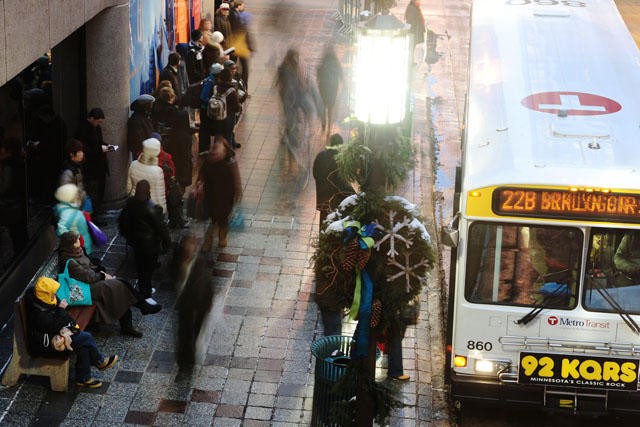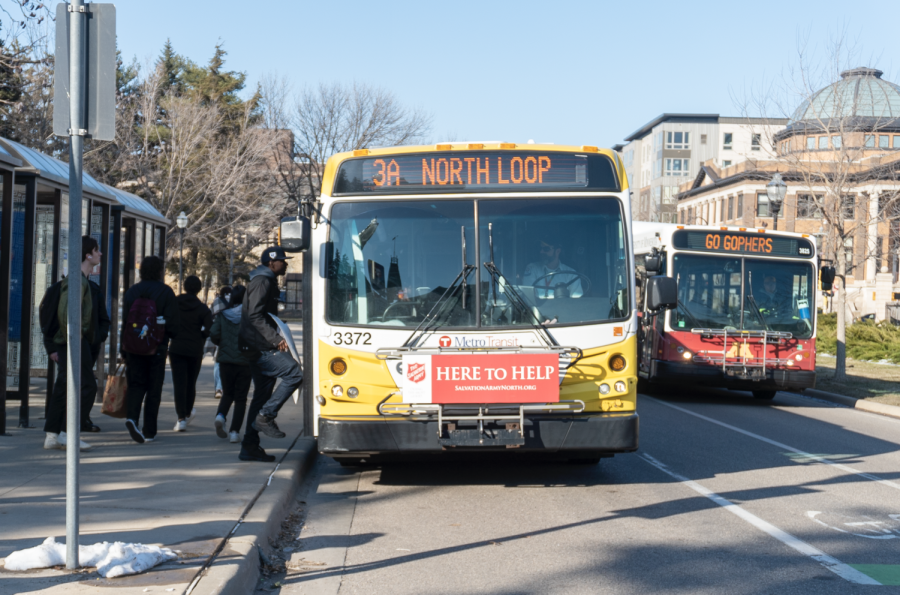With the temperature below 20 degrees and wind chill making it feel even cooler, Mercedes Ruiz stood at the corner of Seventh Street and Nicollet Mall waiting for a bus to arrive.
She used to take this route every day to get to her job at McDonaldâÄôs in North Minneapolis. And every day sheâÄôd have to cram onto a packed bus.
The bus stop, consisting in its entirety of a sign and a few benches, is paltry compared to the number of people who use it every day âÄî nearly 3,900 âÄî and lacks amenities that other bus stops have.
The stop prompted Students for Transit Equality, a group at the University of Minnesota, to start an information campaign shedding light on âÄúracial and economic inequalitiesâÄù in the Twin Cities transit system and promote an upcoming Minneapolis plan that would remedy the situation.
The âÄúDowntown East-West Transit Spine PlanâÄù would redirect many local routes onto Seventh and Eighth streets, add shelters and widen sidewalks.
The Seventh Street and Nicollet Mall intersection is the single busiest bus stop in the city, but lacks a shelter, signs showing updated arrivals and other amenities common to express routes.
Many of the newest bus shelters, which include lighting and real-time signs, are on Marquette and Second avenues. These primarily see express buses that serve suburban commuters, while the proposed east-west transit spine has many local routes going to North Minneapolis and Brooklyn Park, areas with higher minority populations.
âÄúWe think [the current situation is] favoring suburban commuters over urban commuters,âÄù said Peter Caldwell, a member of Students for Transit Equality. âÄúWe see it as an economic injustice.âÄù
The group believes the new transit plan would fix the inequalities between the express and local routes.
Metro Transit guidelines state shelters should be installed when daily boardings exceed 40 passengers, making the Seventh and Nicollet stop nearly 97 times higher-volume than guidelines recommend. Based on the cityâÄôs assessment, nearly every bus stop on the east-west transit spine should have shelters.
âÄúWe want to put pressure on Metro Transit to make that the norm âÄî that bus shelters are built and heated once the ridership numbers reach the projected amount,âÄù Caldwell said.
Suburban commuters benefit more from the current transit situation with better amenities and larger subsidies, he said.
âÄúThereâÄôs definitely economic inequality,âÄù he said. âÄúWhether thatâÄôs classism or racism is up to others to decide.âÄù
Anna Flintoft, a transportation planner for Minneapolis, said she hadnâÄôt heard complaints to the city about inequality with the current transit plan and denied that the system purposefully favors suburban commuters.
âÄúI would agree that the quality of facilities at [those] bus stops are not as good as those on other streets,âÄù she said. âÄúItâÄôs not intentional inequality, but it definitely is a transit street in downtown that has the least quality facilities.âÄù
The project saw some delays when the City Council sent the plan back for review after concerns from businesses and community leaders on the impact of traffic.
The project is open to public comment from Dec. 13 to 31, with the City Council reviewing it in mid-January. If all goes as planned, the project would start in July and be completed sometime in the fall.
The express routes that serve Marquette and Second avenues received $32 million in federal funding and were finished last year. The East-West Transit Spine Plan, which is requesting 10 times less, is still waiting on federal funds.
Ruiz just wants to stay warm. After moving to the Columbia Heights neighborhood in Minneapolis, she now uses the Seventh and Nicollet stop about once a week. Nonetheless, sheâÄôd like to see shelters with heaters on at least every other block.
She said she doesnâÄôt hold a grudge against people who have better bus amenities using express routes, but added, âÄúLife isnâÄôt fair.âÄù
Daily Email Edition
Get MN Daily NEWS delivered to your inbox Monday through Friday!

Published April 18, 2024

Published April 18, 2024

Published April 18, 2024
Trending
Student group fights busing inequality
The group wants to improve some downtown bus stops lagging behind suburban counterparts.

Pedestrians wait for the bus at 7th Street and Nicollet Monday night. It is the most used bus stop in the entire metro area where thousands of people board every day.
by Andre Eggert
Published December 7, 2010
Leave a Comment
More to Discover
Advertisement
The Minnesota Daily • © 2024 The Minnesota Daily • Privacy Policy • FLEX Pro WordPress Theme by SNO • Log in













